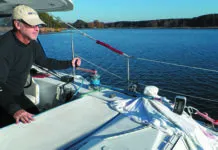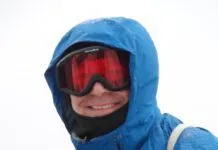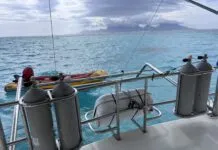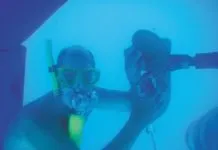The pygmy sperm whale rolled and flapped its tail as it struggled at the swash line. It was about the size of a big porpoise, clearly weakened by the ordeal. Police had cordoned off the beach and were waiting for a wildlife expert to arrive.
Two volunteers from the marine animal rescue society arrived and asked if anyone could help. With some careful effort, four of us dragged the whale back into waist deep water where we supported it with our arms. Every few minutes it would raise its head slightly and breathe through its blowhole. We waited for the veterinarian to arrive.
The vet, we were told, would decide if the whale could be saved. Once theyre stranded, theres not much we can do, said one of the rescuers. These species doesn’t do well in captivity.
I watched the blowhole open and close. We shifted positions, and I moved toward the head. The whales heart pulsed in my hand. Bump-bump, bump-bump, . . .
Very few people have seen a pygmy sperm whale in the wild. Relatively little is known about the species. It is assumed that they prefer deeper waters, and that is why theyre scarcely seen.
After about an hour of keeping the whale afloat in our arms, a volunteer who had walked up the beach to check on another stranding. It was a juvenile, presumed to be the calf of the female we were tending. It was dead.
Our whale lifted its head.
Bump-bump, bump-bump . . .
After forty minutes, the lead rescuer asked if anyone was tired, or wanted to swap places with some other volunteers on the beach. Two people raised their hands, but I wasnt going anywhere.
One of the greatest thrills of living aboard is the chance to observe, appreciate, and, if were lucky, experience a closer connection to the sea life around us. During our 10 years of cruising aboard Tosca, Theresa and I enjoyed dozens of intimate encounters with wildlife, moments that left us in awe, and, sometimes, a little afraid.
On several occasions on long Pacific passages, birds would land on the boat. Fearless, some of them would stay for days before resuming their migration. En route from Papua New Guinea to Guam, a humpback whale twice as long as our 30-foot ketch swam alongside, following us all day and into the night. It would roll on its side and stare at us with its huge black eye as if judging the trim of our sails.
The pygmy sperm whale closed its eyes. Its pulse grew stronger then weakened again. Bump-bump, bump-bump . . .
Once, in the Pacific Island nation of Vanuatu, an overly friendly dugong (the Indo-Pacific cousin of the manatee) came to visit Tosca at anchor. Eager to get closer, we jumped into the water with our mask and fins. The dugong rose to greet us.
For the next four hours it frolicked with us, rolling somersaults, playing hide and seek, and nuzzling our wetsuits. The behavior seemed odd until his intentions became clear. It was
Theresa-the dugong adored her.
Several minutes passed without the stranded whale raising its head. The veterinarian had arrived and waded out. The whale seemed no weaker than it had when we had first found it, but it also seemed no stronger.
She took the whales pulse, checked its body and sighed. She walked back ashore to get her syringes ready. Theres nothing else we can do, she said.




































